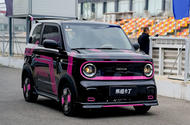Amid calls for Europe to embrace a new class of tiny electric cars, we sample one of China’s best-sellers
The Geely Geometry Panda Mini EV is better equipped than many used cars costing £6000. It has a touchscreen with Apple CarPlay, a reversing camera, air-con and electric windows. One big difference: that’s the price brand new.
The Panda (no relation to the Fiat) exists within a relatively new Chinese class of car: a tiny, electric, four-seat runabout that, unlike Europe’s quadricycles, is actually useable in town and country. It will do 50-60mph, carry four and travel 124 miles on a charge.
It’s also pretty fun to drive, as I experienced on a Beijing race track (improbably). The 17kWh battery situated under the floor means that any trepidation you feel approaching the first corner, given its normal car height (1655mm) and shrunken length (3155mm), is dispelled pretty quickly. It zips around, aided by steering that’s surprisingly responsive.
These tiny electric runabouts have become big business in China, led by its most famous example, the Hongguang Mini EV from Wuling, a brand in the stable of MG parent company SAIC. In its best year of 2022, it sold more than 400,000 units in China.
The success of these EVs begs the question: shouldn’t Europe and the UK be overhauling quadricycle regulations to try the same? Given that EVs are heavier than the ICE cars they replace, it makes sense to encourage a special minicar class with reduced battery material and a smaller footprint.
This is the dream of Renault Group CEO Luca de Meo, who has used his platform as chairman of European car industry lobby group the ACEA to call for a Japanese kei-style small car category that offers certain benefits not available to bigger EVs.
In China, these EVs make ideal first cars. Geely product specialist Liuxuan, 26, picked the Panda from the company car list as her first wheels. “My driving is not so good, so this is perfect for me,” she told Autocar about her bright pink example at the Beijing motor show.
Packaging four seats in a 3m-long car inevitably means you can fit only tiny 12in wheels, which – combined with the slab sides and a cabin tall enough to seat four, very upright adult humans – means they do look more than a little like pieces of giant wheely luggage.
That design flaw is countered by a range of inventive and playful solutions to appeal to their mostly younger customer base. These include vibrant paintwork (as on Liuxan’s car), an intentionally comical roof spoiler on the Panda Knight, a convertible version of the Hongguang Mini and the oddly appealing Baojun Yep mini-SUV.
One version of the Panda plays on the SUV theme with a Land Rover Defender-style ladder and black ‘handles’ on the bonnet. This is a long way from the po-faced dorkiness of the old Reva G-Wiz.
The low, low cost of these cars is a product of falling battery prices and the segment’s almost universal use of lower-cost lithium-iron-phosphate (LFP) battery chemistry, which gives them a range that far exceeds the lead-acid batteries that preceded them.
The added range also means they qualify for new energy vehicle (NEV) credits that their makers can sell to other brands that would like to carry on with combustion engines.
Despite this, the segment isn’t as hot in China as it was two years ago. Hongguang Mini sales almost halved last year to 237,863, according to sales aggregator Bestsellingcarsblog.com. Partly that’s due to newcomers such as the Yep, the Changan Lumin and the Rainbow from newly revived Zhidou.
Ultimately, though, the segment is shrinking, from almost 30% of new EVs in 2021, with sales of more than one million to below 10% last year, well down from its six-figure record, according to research from the Oxford Institute for Energy Studies.
Two factors are at work here. One is that cities such as Shanghai are blocking the smallest EVs from schemes to restrict new licence plate allocation to EVs only. Whether you’re 3m long or 5m long, you’re still traffic. The other is that a new class of 4m-long, four-door electric superminis is expanding with prices almost as good.
The BYD Seagull, costing from the equivalent of £8100, leads the pack with 239,270 sales last year, followed by Wuling’s own Bingo at 167,764 (costing from just £6,000) and the well-regarded Leapmotor T03, which leads owner reviews on the Autohome car sales portal above the Binguo.
“In China’s heart, we want to purchase big cars,” said one senior executive at the Beijing show. “We only purchase small cars because of price, not a desire to own one.”
Indeed, a premium mini-EV, the Arcfox Lite, was quickly discontinued due to lack of customer interest.
Around 2.2 million Smart customers have shown us that Europeans do have that desire – and Smart under its new 50:50 ownership by Geely and Mercedes-Benz is planning to return to the segment with a reborn Fortwo.
However, the Project 2 feasibility study has already rejected the Geely Panda platform, European CEO Dirk Adelmann told Autocar.
Despite the regular fitment of airbags in the segment, high levels of tech (including app-controlled unlocking and cabin warming in the latest cars), the Chinese low-cost mini EV segment just isn’t up to the sophistication that Smart is looking for.
“These are not full-fledged cars,” Adelmann said. “A Fortwo successor needs to fit the brand: a real car capable of going onto the autobahn or motorway and having the premium aspect.”
We will of course get the Dacia Spring (built in China but not sold there), priced from £14,995, making it the UK’s cheapest proper car. But the dream of doling out a fleet of £6000 EVs for the family is one that’s likely to remain in China.







